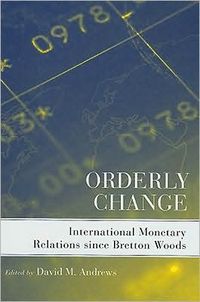

Purchase
International Monetary Relations Since Bretton Woods
Cornell University Press
May 2008
On Sale: May 15, 2008
245 pages
ISBN: 0801473993
EAN: 9780801473999
Hardcover
Add to Wish List
Non-Fiction Political
David M. Andrews, Scripps College
Jeffrey Chwieroth, London School of Economics
Lucia Coppolaro, European University Institute
E. Richard Gold, McGill University
Eric Helleiner, University of Waterloo
Louis W. Pauly, University of Toronto
Wesley W. Widmaier, St. Joseph's University
Anastasia Xenias, New York University
Hubert Zimmermann, Cornell University The Bretton Woods Conference of 1944 resulted in the
formation of the International Monetary Fund and World Bank
and helped lay the foundation for an unprecedented
expansion of international commerce. Yet six decades later,
at the beginning of the twenty-first century, the central
characteristics of the Bretton Woods system remain disputed-
-and the subject of continuing public policy debate. Relying on extensive access to IMF, World Bank, and other
archives, the authors show that the history of
international monetary relations since Bretton Woods is one
of "orderly change"--that is, change within a sturdy but
supple framework. Even during the years of fixed exchange
rates, very different practices characterized international
monetary relations immediately after World War II, during
the 1950s, and during the 1960s. Later, when the fixed
exchange-rate system collapsed, underlying commitments to
trade liberalization in the context of continuing national
economic policy autonomy survived and even flourished.
However, the resulting international economic order is now
in grave danger: the tension between states' autonomy and
their mutual openness has become acute, as international
monetary structures no longer appear capable of mediating
between these objectives. David M. Andrews and the
contributors to Orderly Change examine past transitions as
a means of suggesting possible avenues for current and
future policymaking.
Comments
No comments posted.
Registered users may leave comments.
Log in or register now!
| 


 © 2003-2024 off-the-edge.net
all rights reserved Privacy Policy
© 2003-2024 off-the-edge.net
all rights reserved Privacy Policy